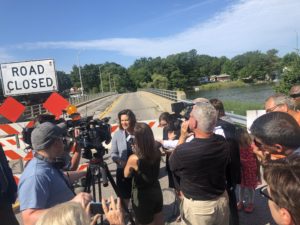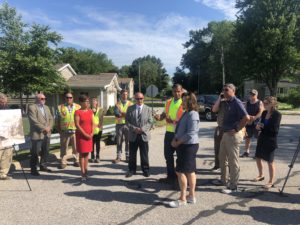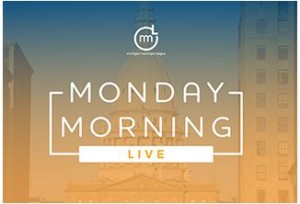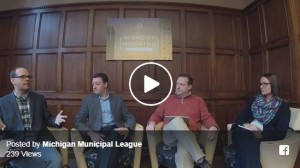The Legislature’s summer recess continues throughout the month of July, as leaders meet with their respective caucuses to determine what approach(es) they might take during negotiations with the Governor on road funding. While tentative session days are scheduled this month, the consensus is that they will not reconvene until sometime in August, once they are closer to an agreement on roads and the budget.
Road Funding
While each caucus is meeting internally on road funding, no new funding proposals have been announced, although numerous concepts are being floated in the media. Additional local option road revenue ideas seem to be on the table in both the House and Senate, but what specifically those local options could look like is still to be decided. League staff are working closely with House, Senate, and Executive leaders to provide input and feedback on a wide variety of proposals that are being considered.
There does seem to be quite a bit of cross-chamber discussion on the notion of shifting sales tax off of gas and raising the gas tax to match the equivalent level that had been charged at the pump. The potential gas tax increase from the shift would equate to approximately 15 cents, raising roughly $850M in new revenue for transportation, and is similar to what the House called for in their version of the budget. One proposal that has been floated to hold schools and local government harmless from a shift away from sales tax at the pump, involves bonding to cover the state’s MPSERS school pension annual liability. Both chambers seem supportive of back-filling schools and revenue sharing in some fashion if the final package includes this shift.
Many individual legislators, along with the Governor are touring the state this summer holding townhall meetings and press events to discuss the need for additional road funding. The Governor visited the closed Smith’s Bridge in Ferrysburg/Spring Lake on July 17, and House Transportation committee chair Jack O’Malley (R-Lake Ann) continues his statewide townhall tour with an event scheduled in Saginaw Township on July 22, following recent appearances in Marshall and Niles. Other individual legislators are holding their own office hours meetings on the road funding issue with local and state road officials, as well.
 |
 |
PFAS
At the Governor’s direction, the Department of Environment, Great Lakes and Energy’s PFAS Action Review Team (MPART) recently announced the results of their science advisory workgroup’s health-based values recommendations for drinking water. These initial health recommendations are the first step in the process the Governor has requested for stricter rules on exposure to PFAS substances through drinking water. Utilizing these recommendations, the Department will now proceed to work with stakeholders to develop draft rules for public input later this fall.
The recommendations from the MPART workgroup can be reviewed through our Inside 208 blog here. We are evaluating which League members might be impacted by any forthcoming rule that would match these recommended levels and what actions/costs would be required to remediate any exposure in excess of these new health levels. DEGLE has identified the League as a necessary partner in their process as this process develops.
Recreational/Adult-Use Marijuana Emergency Rules
The state also just released the long-anticipated emergency rules on recreational/adult use marijuana. League staff are working with administration/regulatory officials to review these emergency rules and we coordinated with the state to produce a webinar for League members on these new rules on July 16. A summary of the rules can be seen on the League’s Inside 208 blog here.
Numerous other legislative meetings and workgroups are underway during this summer on important issues like short-term rental zoning preemption, additional tax proposals surrounding personal property tax and charitable exemptions, rail grade separation funding options, and pension and OPEB reporting changes, among others. Once the legislature and Governor arrive at a road funding and subsequent state budget agreement, a regular session schedule should commence in September.
Chris Hackbarth is the League’s director of state & federal affairs. He can be reached at 517-908-0304 and chackbarth@mml.org.




